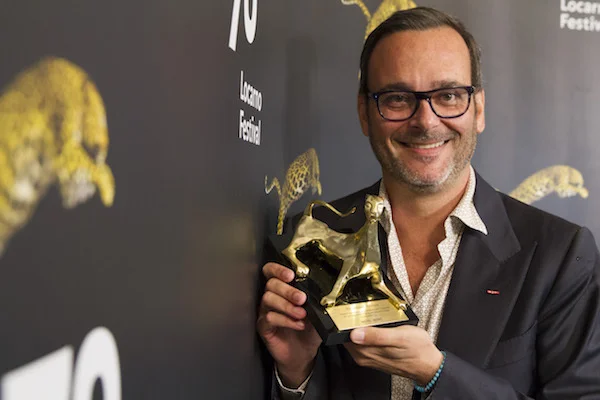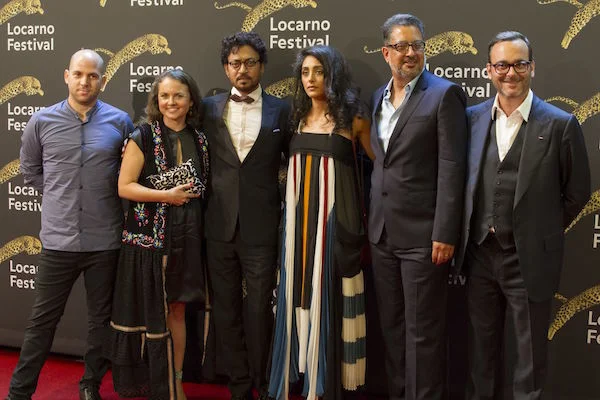When Locarno decided to award their “Raimondo Rezzonico” Best Independent Producer prize to Michel Merkt during this edition of the festival, they proved their undeniable finger-on-the-pulse-of-contemporary-cinema stance. Merkt was handed the award before the world premiere screening in the Piazza Grande of one of the latest films he’s produced — Anup Singh’s ‘The Song of Scorpions’ starring Irrfan Khan and Golshifteh Farahani.
Visionary, global, modern, iconoclastic, young and cool, Merkt has revolutionized the landscape of independent cinema internationally and changed the way we go to the movies. Whereas before films like ‘Toni Erdmann’ and ‘My Life as a Zucchini’ would have been relegated to the darkened rooms of arthouse movie theaters, they are now titles that trip off global audiences tongues as easily as any blockbuster or Hollywood rom-com. And for the past decade, producing an average of five titles per year, Merkt has guaranteed his place in the firmament of star film producers.
It is Merkt’s sense of humor, his kind bright eyes, soft Swiss French accent and unselfconscious good looks that strike me immediately and all at once when I meet him in person during the Locarno Film Festival. Yet it is his deep, vast, and passionate knowledge of the business of cinema, once we sit down to chat leisurely, which make our talk wonderfully memorable. He has a vision, what he wants of himself and more widely of the films he becomes involved in, and that vision is so very broad and open-minded that even after a Q & A organized as part of the popular Locarno Talks he found the time to speak to audience members who wanted to pitch their ideas to Merkt. Oh, and he is a gentleman, something that’s become increasingly more rare in the film world. This last quality could easily be attributed to his Swiss upbringing but I have a feeling it has as much to do with the man himself than with his native Geneva.
If you are an aspiring filmmaker, his words may help you to understand how Michel Merkt’s brilliant decisions are made, and if you are a cinema lover, he may aid in unraveling the craft and energy needed to create that magic we all crave from our big screen entertainment.
For me, the meeting proved a landmark moment which changed yet again how I watch films and in the process, made me fall even deeper in love with the movies.
How does your professional career change after “Oscar-nominated” is added to your name?
Michel Merkt: First of all I’m an Oscar member but I’m not nominated myself, the films are. And that helps a lot. I’m working on new projects and of course if I go to an agency like CAA, to bring talent together, they will use my name now. They never used it before. With this guy, they think, we have more of a chance of achieving a nomination, going to the big festivals and having success, because in his track record. It helps when I pick up my phone, I will speak with the person I want to speak to, not the assistant of the assistant of the assistant — which makes a big difference at the end. More people are coming, bigger projects and more interesting. I’m fighting for creativity.
Stars and directors, once they become famous, can have a harder time dealing with the film world. Is it the same for a producer, or does life get easier as you become more well known?
Merkt: I think it’s just a question of ego. If you can put that on the side then it’s going to be alright. I know I can have problems with people anywhere, and of course we say it’s more difficult with actors, with directors but if from the beginning you know the rules of the game, for me it’s most important that we all talk about the same movie.
How involved are you in your productions?
Merkt: I’m really involved in the script process, in the creative process, in writing but normally I’m not what you call an executive producer in terms of being on set. And if you see me on set it means there is an issue, there is a problem. You don’t want to see me on set. One reason is I prefer to already focus on the strategy, see what we’ll do after, to also have the opportunity to come with a fresh eye when it comes to the editing part, and because I think that nowadays if you can’t produce four or five movies per year, the business model doesn’t work anymore. You need to have different ones because one will disappear every year, not because it’s not a good film, because it’s the wrong timing…
You bring up timing. That’s a challenge in itself.
Merkt: The film ‘Valentin Valentin’ for example, was supposed to release on the day of the terrorist attacks at Charlie Hebdo in Paris.. And when you compare a film to what is happening in real life, it’s like OK, done. We do have TV and DVD and all that. The same with ‘Life’ a good film. We had a great gala in Berlin and then nothing happened. The magic didn’t happen, we don’t know why. It could be many things.
That’s also about timing, when you want to release, and what festival?
Merkt: For me Cannes is the most important because of all the press and the market there, it’s the easiest. But if you fail it’s the worst one because everyone will know and then you disappear. Also, it’s very early in the awards season race and if you want to maintain the buzz till then it’s going to cost a lot. When arriving super early, the others will know you are the one to beat, so they will try to kill you. Suddenly you are a competitor, and if you’re a competitor from Sundance, they have one year to make you disappear.
PHOTO: LOCARNO FILM FESTIVAL BY SAILAS VANETTI
Michel Merkt, right & the delegation of ‘The Song of Scorpions’ on the red carpet in Locarno
You’ve worked with Moroccan filmmakers, Portuguese, French, Swiss, Indian, Brazil, Argentina, done films all over the world. How does working on a film change from place to place?
Merkt: I think perhaps I have an added value being Swiss, and I was born and raised in Geneva, having from the beginning this diversity and international point of view. I’m not really focused on the nationality of someone, what I’m looking for is a vision that is something different. They have different points of view and different cultures and it’s amazing to do that but sometimes it’s very difficult. Yet it always brings something different to the world. I want a very precise cultural vision with an international potential. I don’t like to talk about commercial success, rather wide audiences, to touch everyone.
When I think of you, I think of a bridge uniting cultures. Is that something that you are conscious of, the idea that cinema has such a wide reach and can be a tool for understanding “the Other”?
Merkt: I think we have to remember that we work in entertainment, so first of all we have to entertain. That’s really important. But yes, we are all interested in different things, want to watch different things — I said once there are too many movies but not enough good ones. If you differentiate yourself and show other visions, people are interested to see other things and after entertaining them you try to interest, to show something, to have people talk after the movie. Even if it’s not the perfect movie, if at the end I see people talking about it, that’s already a success. Rather than trying to change the world, I would say try to change the vision of the world with culturally specific things that could touch everybody.
How do you get from being a young, fresh on the scene independent producer to being someone who now receives the Visionary of the Year award in Locarno?
Merkt: A lot of luck. Being in the right place with the right people. Because I am not doing it alone! Everyone I work with is at their level the best there is. My work is to facilitate, to put the right people together. When Carlo [Chatrian] asked me to come here for the prize, he also asked me to bring two movies. And one I brought is ‘Maps to the Stars’ because at this point it was my first big movie, but it could have been my last. And I was thinking about it then, saying “perhaps I quit after this.” That’s why I brought it here, but the rest is history.
Why did you feel that, because it was a make it or break it kind of thing for you?
Merkt: I thought perhaps this was not the right job, not for me. Perhaps it’s too complicated, it’s too dangerous, it’s too risky, not just in terms of money. You need recognition not for my own ego but for the film you are making. Thinking, yes it’s right, I did something right, which is the case now. That validation, meant I was not alone. This prize in Locarno is being given to me, yes, but it’s like it is going to five thousand people. Everyone I’ve worked with on the different movies I’ve done so far.
I would love more recognition for the technical part. Editors, sound designers, DoP and all those people we never talk about and are just as important as the others. We are in Switzerland now and I always like to compare it to a Swiss watch which has many pieces you don’t see, yet if one is not there, the watch just doesn’t work.
How many scripts do you get per month?
Merkt: I would say four or five per week. What I do normally is I ask people to send me a synopsis now. If I like it, I’ll ask for a script so now I’m reading one or two scripts per week but I will receive two or three synopsis per day, something like that… 80 to 90 percent I put aside, not because they are good or not good, but just because I have this feeling that I’ve already seen them. And that’s the first thing. For example, currently I’m not interested in WWI movies because next year it’s going to be the hundredth anniversary and so you’ll have twenty movies about it.
That’s one of your criteria then, to avoid what everyone else is making?
Merkt. What I’ve already seen is out. It’s already been done. My father asked me once “why aren’t you making the same movies the others are doing?” And I told him “the others are doing them!”
That must have been an interesting conversation, I’m sure it didn’t end there!
Merkt: He laughed, and said, “you’re not wrong”.
What do you look for when you go to the movies?
Merkt: What I really like is to take part in festival juries, which I try to do twice a year, because I can watch movies I didn’t pick. That’s very interesting and I’m very interested in first time directors because I want to be surprised and moved from my chair, and to learn something. That’s something I had with ‘The Usual Suspects’ and with one of Darren Aronofsky’s first, ‘Pi’, things like that where I’m like “No! He didn’t do that, wow!” And after one or two days you know if it was something amazing — I’m looking for the “oohf” factor.

